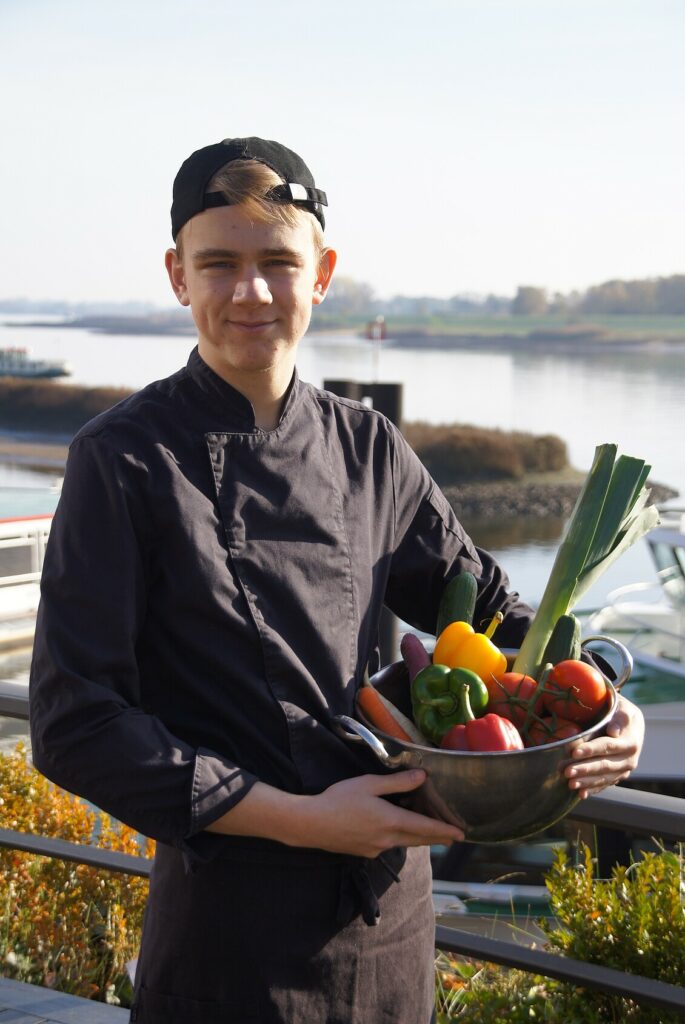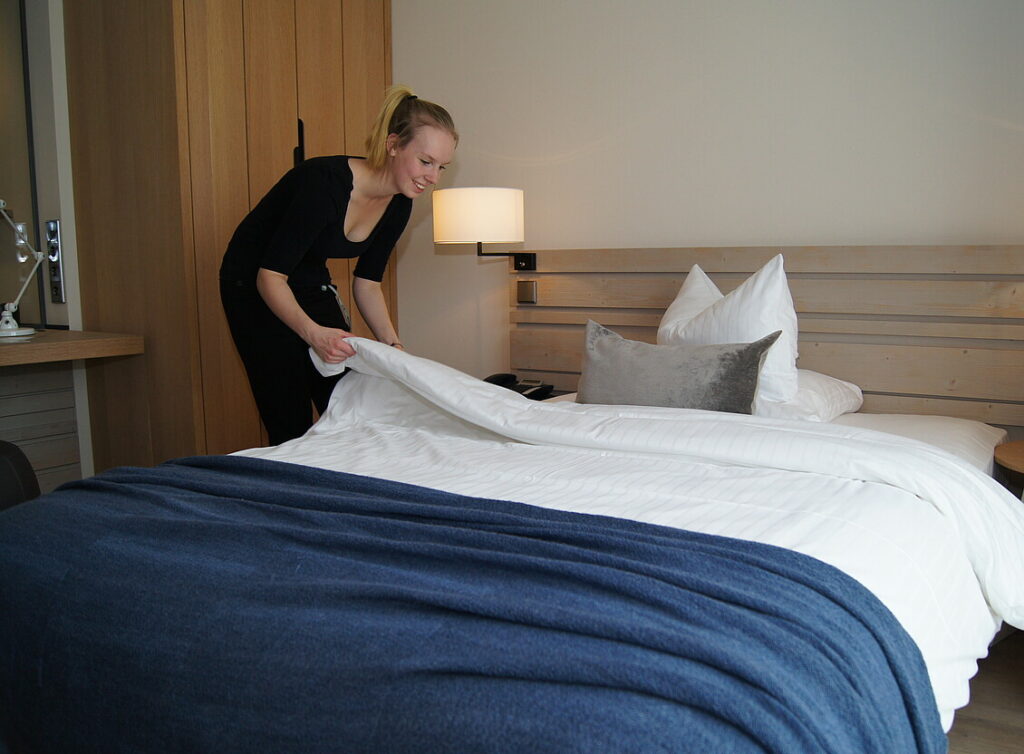Apprenticeships
An overview of our apprenticeships for you


(m/w/d)
Hotel compartment
Reception: Carrying out the check-in, informing about breakfast times and explaining the way to the room – typical tasks of a hotel manager when he or she is assigned to the reception. In addition, they are familiar with the hotel software, where the room reservations are stored and answering telephone inquiries is also part of this area.
In the office: planning conferences and weddings or department meetings. Behind the scenes of the hotel you have to take care of organizational and administrative tasks.
Housekeeping: Dusting, changing the beds and stocking the bathroom with hygiene items – tidying up work, better known as housekeeping, is also part of the day-to-day work of a hotel manager. Because she or he has to ensure, among other things, that the rooms are clean before new guests move into them.
Restaurant work: Guests are advised on the choice of food, recommended the dish of the day and the right wine to go with it. In addition, you serve the dishes, bring the bill and collect the money. If the hotel has a terrace or a beer garden, they will also look after the guests there. Care is taken to ensure that every guest is taken care of and that the outdoor facilities are always in presentable condition.
Kitchen work: the salad as a starter, potatoes as a main course and ice cream as a dessert – as a hotel manager | As a hotel manager, you not only know the menu by heart, but also help with the preparation in the kitchen. Of course, the prevailing hygiene regulations are observed.
Im Büro: Tagungen und Hochzeiten planen oder Abteilungsmeeting´s. Hinter den Kulissen des Hotels muss man sich um organisatorische und verwaltungstechnische Aufgaben kümmern.
Housekeeping: Staubwischen, die Betten neubeziehen und das Badezimmer mit Hygieneartikeln ausstatten – auch Aufräumarbeiten, besser bekannt als Housekeeping, gehören zum Arbeitsalltag einer Hotelfachfrau oder eines Hotelfachmannes. Denn sie oder er muss unter anderem dafür sorgen, dass die Zimmer sauber sind, bevor neue Gäste diese beziehen.
Restaurantarbeiten: Man berät Gäste bei der Auswahl der Speisen, empfiehlt das Tagesgericht und den passenden Wein dazu. Zudem serviert man die Gerichte, bringt die Rechnung und kassiert ab. Verfügt das Hotel über eine Terrasse oder einen Biergarten, übernimmt man auch dort die Gästebetreuung. Man achtet darauf, dass jeder Gast versorgt ist und die Außenanlagen immer im vorzeigbaren Zustand sind.
Küchenarbeiten: Den Salat als Vorspeise, Kartoffeln als Hauptspeise und Eis als Dessert – als Hotelfachmann | Hotelfachfrau kennt man nicht nur die Speisekarte auswendig, sondern hilft auch bei der Zubereitung in der Küche mit. Dabei achtet man natürlich auf die herrschenden Hygienevorschriften.
As a rule, hotel managers wear prescribed work clothes. Exactly what they wear depends on the hotel and the department. If you work at the reception, you often wear a jacket or blazer, which is combined with black pants, knee-length skirts and black closed-toe shoes.
For reasons of hygiene, hotel managers wear a hairnet in the kitchen. Rubber gloves are worn when cleaning up, and a white blouse is required for waiters in restaurants, for example.
Organizational talent: At the reception you have to do different tasks at the same time: the phone rings, someone wants to check in and another guest is putting their luggage in the trunk. As a hotel specialist | As a hotel manager, you know who’s turn is and when, so you set priorities.
Doers: Be it cleaning up the rooms or helping with the preparation of meals – you put work orders directly into practice and support your colleagues.
Entertainer: The care of the guests makes up a large part of the training. You answer questions, give recommendations or tell something about the history of the hotel. You are always polite and accommodating.
Both job-specific and interdisciplinary content are on the curriculum at vocational school. Subject-specific topics are, for example, merchandise management, guest orientation and hotel organization. General subjects include politics, English, German and arithmetic.
Some vocational schools offer so-called differentiation courses, i.e. a kind of elective courses. Then, in addition to the prescribed subjects, you can take a wine, cooking, cocktail or language course, for example.
First of all, it is about the area of guest orientation, where you deal with beverages as well as glasses, cutlery and crockery. As a prospective hotel specialist, you also learn how drinks and food are served Hotel specialist already in the first year. In addition, you deal with operational management and learn how registrations are registered or rejected, and which guidelines in the area of data protection must be observed. English courses are also attended right at the beginning of the apprenticeship.
Now the focus is on advice and sales in the restaurant. How are guests properly advised? How do you deal with complaints? How do you conduct professional discussions with customers who may be complaining or who have particularly specific questions? These and many other questions will be answered in the second year of training. Inventory management is also on the curriculum. Then you learn, among other things, how to place orders and determine sales prices economically. Another subject area is goods service, which teaches how guest rooms are cleaned and prepared.
In the last year of training, you deepen your knowledge in the field of guest orientation. Now it’s about the reception area and how, for example, you create offers, carry out guest orders and manage the hotel cash register. Furthermore, you become familiar with marketing topics and learn how to develop and implement concepts. Finally, when it comes to the subject of business services, one finds out how the staff is best deployed.
During the training you get to know all the departments in the training company – but there is no fixed order. In the first year of training, for example, you work in the kitchen and help to prepare salads. Another day you help out in the restaurant, taking orders and serving drinks. You also work on the breakfast buffet, for example.
In the second year of training, you conduct sales talks, serve food and can even help design the menu. In addition, aspiring hotel professionals learn how guest rooms are cleaned and properly prepared. In larger restaurants you can even be involved in the creation of a marketing concept.
In the last year of training, you will be deployed more frequently in the reception area, where you will carry out check-ins, implement guest requests and look after guests. It can also happen that the trainees are involved in the preparation of events, for example when they work in a trade fair hotel.
In the second year of training, you conduct sales talks, serve food and can even help design the menu. In addition, aspiring hotel professionals learn how guest rooms are cleaned and properly prepared. In larger restaurants you can even be involved in the creation of a marketing concept.
In the last year of training, you will be deployed more frequently in the reception area, where you will carry out check-ins, implement guest requests and look after guests. It can also happen that the trainees are involved in the preparation of events, for example when they work in a trade fair hotel.
- You find it easy to remain friendly even in stressful situations.
- You want to be active at work and like to try new things.
- You enjoy working in a team and with customers.
- you want regular working hours
- you do not enjoy dealing with customers.
- you lose track in stressful situations.
What do hotel professionals earn?
(m/w/d)
Restaurant and event catering
set the tables
Specialists in restaurants and event catering ensure that all tables are set properly and are descriptive. She or he polishes glasses and cutlery, lays them out, fills up the containers for salt and pepper and decorates the tables with small tea light candles, for example.
receive guests
When guests arrive, greet them and check the reservation or offer them free seats. As soon as the guests are seated, they are given the food and drink menu.
advise guests
What is today’s dish of the day, which ingredients are included and which wine goes best with it? Restaurant and event catering experts advise guests on the choice of food and drink by making recommendations and informing them about ingredients and preparation methods, for example. Precise information for allergy sufferers or vegetarians is also important.
to take an order
After the guest has decided, the order is noted on a notepad or on a portable ordering computer. The order is then sent to the kitchen and the drinks counter.
Serving and billing for food and drinks
Restaurant and event catering specialists serve food and drinks. If the restaurant has a bar, they also prepare mixed drinks, for example. When the guests have finished eating, the specialists clear away the food and drinks and take care of the payment.
do rework
As soon as the guests are gone. Of course, this also includes clearing and covering tables, tidying up dining rooms and preparing daily accounts.
prepare events
If an event with many guests is imminent, restaurant and event catering specialists draw up the schedule, make menu suggestions and calculate the costs. At the event itself, they ensure that everything runs smoothly.
Do room service
Restaurant and event catering specialists carry out room service in hotels. They take orders over the phone and set everything up on a tray or trolley before the food and drinks are brought to the hotel room.
As a specialist in restaurants and event catering, you have very good career prospects, as the catering trade would not work without them. With so many restaurants and the popularity of eating out, there is no need to worry about finding a job.
Your locations at a glance
restaurants
restaurants
pensions
retail catering establishments
catering services
As a professional | As a specialist in restaurant and event catering, you work – as the name already suggests – primarily in restaurants and inns. You can also find employment in hotels or guesthouses. You can also work in gastronomic facilities in department stores, for example. Another place of use is e.g. the catering service.
In gastronomy, in addition to working on weekdays, you also have to work on weekends, on public holidays and at night.
working hours
shift work
weekend work
holiday work
night work
Specialists in restaurants and event catering wear work clothes in their everyday work, although there is no uniform regulation. They often wear the uniform prescribed by the house. This often consists of a shirt/blouse, trousers and an apron.
organizational skills
In your job you take care of the satisfaction of the guests, a smooth daily routine and the planning of big celebrations. Therefore you should be organizationally fit.
entertainer
You love working with people and are good at communication. You serve your guests in a friendly, courteous manner and with good manners and are always available for a little chat.
perfectionist
The highest level of concentration is required when collecting the cash, and accuracy is also important when setting the tables. Precise work should therefore suit you for this job.
The dual training as a specialist | Specialist for restaurant and event catering usually lasts three years. During this time, prospective restaurant specialists attend the vocational school and the training company at the same time. The vocational school lessons, which take place in the form of blocks, serve as the theoretical basis. Apprentices learn everything there is to know about topics such as kitchen work, service and marketing. They put their theoretical knowledge into practice at work.
Future specialists learn at the vocational school | Experts, for example, how to advise guests when making their choice, how food and drinks should be served and how to react in the event of complaints.
Working in the kitchen
For work in the kitchen, trainees find out about the basics of food law, such as personal, operational and product hygiene. You will also learn how to choose the right ingredients for a recipe and how to achieve a balance between nutritional content and energy value when preparing food.
Working in service
In order to be able to offer good service, you learn at the vocational school how to set tables, set up buffets and serve drinks and how to deal with guests. Different serving methods and communication rules are used for this.
Working in the magazine
For the work in the magazine – i.e. the written work in the office – prospective acquire knowledge about data backup and data protection. You will learn to distinguish between different types of sales contract and to recognize disruptions in the sales contract. In addition, they familiarize themselves with order and delivery notes.
Advice and sales in the restaurant
Sales psychology knowledge is taught at the vocational school, which enables trainees to conduct sales talks with customers. Learning the technical language is also part of the timetable for trainees.
marketing
As a future specialist for restaurants and event catering, you learn to understand marketing as a sales-promoting concept. You become familiar with different marketing tools such as promotions and assess the advertising measures from the perspective of the target group.
economic service
Trainees are aware that cleanliness and hygiene are of central importance for the well-being of the guest and the success of the business. They select cleaning and care products according to economic and ecological criteria and draw up a work plan for cleaning, care and preparation of guest rooms.
merchandise management
The vocational school teachers provide the trainees with knowledge about the conclusion of legal transactions. They are trained to prepare purchase contracts for the company and to conclude them in accordance with instructions. In addition, they learn how to process payment transactions correctly.
Working in the reception area
In the reception area, trainees process reservations, welcome and look after guests and create guest invoices. At vocational school, for example, you learn how to deal with complaints.
Working in marketing
Trainees carry out weaknesses and strengths analyzes for companies and, based on this, define goals and tasks for marketing. For the implementation of the measures, they discuss sensible budgeting in the group.
leadership roles in economics
In this module, future specialists for restaurants and event catering learn about the importance of motivation, management style and training. They plan the deployment of employees and create duty rosters. They also learn how to carry out inspection work in the guest rooms.
Apprentices begin their day-to-day work by setting the tables and arranging flower decorations on the tables, for example. In addition, they label the display board with today’s specials.
When guests arrive, they take their orders and pass them on to the kitchen staff. It is important that restaurant professionals actively approach the guest in order to start a conversation and recommend food and drinks, for example.
The restaurant manager learns from her experienced colleagues that you always have to serve to the right of the guest. While the guests are dining, she always keeps her eyes open to notice wishes and requests without being intrusive. Idle times are used to polish glasses and cutlery.
The prospective restaurant specialist | future restaurant specialists are also taught how to pour drinks correctly: when pouring, the left hand must be held behind the back, the glass must not be filled to the brim and the bottle must be twisted off so that no splashes occur. In addition, the trainer shows his trainees the techniques they can use to safely transport three or four full plates at the same time.
What do restaurant and event catering professionals earn?
(m/w/d)
A cook
Turquoise water, white beaches, tropical temperatures or rather untouched fjords with steep cliffs and wild animals? As a cook, you can have it all—when you work on a cruise ship. But also on land – and that is the rule in this job – things are exotic and varied almost every day. You cook spaghetti bolognese, nasi goreng, coq au vin and dishes you’ve never heard of before.
Create meal plans: Before it goes to the stove, the cook creates | the cook the menu. He not only makes sure that the food is as varied as possible, but also takes into account the current season and special customer requests. Asparagus, for example, is typically available in spring, while more mushrooms appear on the table in autumn. As a chef, you also have to be aware of the expectations of many different groups of people – from diabetics to vegetarians.
Purchasing ingredients: Especially in smaller restaurants, chefs are responsible for purchasing the ingredients in addition to the actual cooking. This includes, among other things, comparing the prices and quality of goods from different retailers and calculating the amount of food.
Store ingredients: As a cook | As a cook, you also have to know where and how which ingredients are stored – potatoes, for example, dark and cool, raw meat never together with other foods due to the risk of salmonella. This is also specified by the hygiene regulations that must be observed in restaurants. Regular checking of the shelf life of the food is also part of the chef’s area of responsibility.
Preparing dishes: The range of different dishes that a cook can prepare | Cook prepared is huge. That’s why the employees in canteen kitchens are often specialized in certain sub-areas: while one chef cuts the meat and prepares it further, another cleans and cuts the salad. Another person takes care of the side dishes. Kitchen appliances such as mixers, microwave ovens and fryers make the cook’s work easier.
Arranging food: The dishes should not only taste good, but also look appealing. The chefs pay attention to this when arranging the dishes on the plate. He or she also checks that the dish is complete and that it matches the order before the service staff sets off with the dish to the customer.
Creating a workflow plan and supervising staff: As a chef, you also plan the deployment of staff and the workflow, depending on your position. As a head chef, it is part of the job to assign, guide and monitor subordinate employees, such as the kitchen help staff.
Cleaning and tidying up the workplace: At the end of the working day, tidying up is the order of the day. Unneeded ingredients have to be packed away, kitchen utensils cleaned and waste disposed of. This is all done in compliance with strict hygiene regulations.
Your tasks at a glance
Create a menu tailored to the season and individual customer requirements
Buy ingredients for dishes and store them correctly
Prepare dishes using various kitchen appliances and arrange them attractively
Instruct and supervise kitchen help staff
Clean work area and dispose of leftover food
control inventory
Cooks are wanted! So the chances of finding a job are good. In addition, there are many opportunities to continue your career after training as a chef | to train as a cook. If you specialize in a certain area, for example, you have a unique selling point that sets you apart from other applicants. In terms of salary, the following applies: whoever bears more responsibility earns more. Finally, as a chef | cook also the choice to become self-employed, for example by founding her own restaurant.
As a chef, you primarily work in kitchens, of course. From restaurants, hotels, canteens, hospitals, nursing homes, catering companies and even cruise ships. Jobs can also be found in the food industry with manufacturers of finished products and frozen foods. Depending on your strengths, as a Chef | Cook with appropriate qualifications can also work in the office or in guest rooms.
That depends on the employer. In smaller kitchens, the chef is solely responsible for all work steps – from planning and preparing the individual ingredients to serving. In commercial kitchens, on the other hand, the work areas are often divided up. For example, the saucier is responsible for meat, fish and sauces, while the entremetier takes care of soups and side dishes.
A star, awarded by the hotel and restaurant guide Michelin, is one of the highest awards that a hotel or restaurant can receive. Anonymous testers decide who is recommended in the annual report. Whoever is listed has therefore been awarded a star. Strictly speaking, however, the kitchen and not the chef gets the star. However, since the head chef is responsible for the excellent cuisine, he can call himself a star chef. Incidentally, it doesn’t matter whether it’s a posh restaurant or a snack bar.
- restaurants
- Hotels
- canteens
- hospitals
- nursing homes
- catering companies
- cruise ships
- food industry
Depending on where you work, it is common for chefs to work nights, weekends and public holidays. This is usually regulated by shift work . There is currently a rethink in the industry: working time models make the job more attractive.
working hours
shift work
Also on weekends, at night and on public holidays
about 40 hours a week
In the professional kitchen, as a chef, you wear | Cook usually wears a smock and hood, also known as a chef’s hat. The latter prevents hair from getting into the food. There are also chef’s trousers and aprons.
team player
The kitchen staff work in a very small space, everyone does different jobs and it can get stressful at times. You should like to work in a team and be reliable.
perfectionist
As a chef, you should be able to work under time pressure – and always observe the consumer protection regulations. Caution is also required when handling sharp knives, hot fat and other sources of danger in the kitchen.
Handyman
Do you have nimble hands, are you skilled and creative? Perfect, because chefs work with a variety of kitchen appliances during preparation and then drape the food attractively.
Training to become a chef | Kochin is carried out in parallel in the training company and in the vocational school, so it is dual. The vocational school lessons take place in blocks. The training usually lasts three years, a reduction of six months is possible under certain circumstances.
After the first year, there is a practical intermediate exam, the final exam at the Chamber of Industry and Commerce (IHK for short) at the end has a practical and a theoretical part. In it, the examinee prepares, among other things, a 3-course menu, arranges everything and advises the guests.
Future chefs acquire the essential knowledge and skills related to the kitchen during the training period. In addition, the trainees are also given knowledge on topics such as rights and obligations during training, organization of the training company and environmental protection.
In addition to general subjects such as German and economics and social studies, the vocational school also offers a number of job-specific learning fields. This includes, for example, menus, regional domestic and foreign cuisine as well as cold and warm buffets. English is also a subject, because later on, qualified chefs should also be able to advise foreign customers.
Working in the kitchen
In the first year of the apprenticeship, the trainees learn how to prepare and serve meals according to a recipe. You will also learn the basics of food law and the importance of environmental protection. The safety regulations for working in kitchens are also part of the curriculum.
Working in service
Budding chefs also continue their education outside of the kitchen: in addition to serving food and drinks in different ways, it is about being a good host. Sales and advisory talks are practiced, menu cards are created, guest bills are calculated.
Working in the magazine
The trainees learn how to store which food and check orders. They are also familiarized with office work, which means they learn how a sales contract works, how files are managed and how communication media are used.
Food made from vegetable raw materials
During their training, future chefs learn everything about plant-based ingredients such as fruit, vegetables and grains. It’s not just about how these foods are prepared and stored, but also about their nutritional importance – and specifically about dishes for vegetarians or vegans.
Cold and warm buffets
In order to be able to offer a rich buffet, the trainee must learn not only how to prepare the food but also how to present it in a sales-promoting way.
dessert
Creativity is required here: The trainees gain experience in combining and creating desserts in terms of taste, visual, seasonal and regional aspects.
A la carte shop
À la carte means that guests are free to choose dishes from the menu. This means that the cooks have more work to do and greater uncertainty when it comes to planning. In this field of learning, the prospective cooks are taught how to prepare dishes from meat, game and poultry or fish and seafood.
banquet
A banquet – a feast – requires special planning. Trainees learn what types of banquets there are, how to design menus and how to advise guests. Knowledge of sales psychology helps them with this.
action week
During their training, prospective chefs develop a project that focuses on a specific type of food or a specific country, such as a “mushroom week” in autumn. The trainees plan the action week, select dishes, design offer cards and decorate tables and rooms.
menu
A learning field is dedicated to the creation of meal sequences. The trainees are guided by menu rules and economic aspects. You will learn to conceive different menus for different occasions and design menu cards.
Regional domestic and foreign cuisine
The trainees get an insight into both German and foreign cuisine. They also learn how to research original recipes and how to change them in line with the times.
Devices that you encounter in everyday work
canteen cooker
fryer
combi steamer
kneading machine
Knife
Pan
The practical part of the training takes place in the company, for example in a restaurant or hotel. In the first year of training, the focus is on the basics: You learn how to deal with guests and devices, and gain an insight into merchandise management and office organization.
In the second and third year of training you will take on more responsibility: You will independently prepare smaller dishes such as appetizers, salads and soups based on the food knowledge you acquire at the vocational school. You help with the processing of meat and fish and are increasingly involved in sales promotion.
- you enjoy processing food.
- you like to have your hands full.
- you like to pay attention to order and organization.
- the heat and noise of a commercial kitchen would put you off.
- you don’t like to work fast.
- you don’t want to move a lot at work and generally prefer a regular daily routine.
What do cooks earn?
Merit | Salary

What am I actually earning?
Of course, no one has to work in the Zolli for nothing or even for free!
When it comes to remuneration, we follow the collective agreement of the German Hotel and Restaurant Association (DEHOGA for short).
That’s very good, because DEHOGA not only defines rights and obligations in this collective agreement, but also the minimum wage that every trainee must receive!
In the apprenticeships we offer you will receive:
1st year of training € 1,200.00
2nd year of training € 1,300.00
3rd year of training € 1,200.00
In addition, we support you with the following extra services, which we as a company simply give on top of it:
- We pay for the HVV card so that you can always get to work and school on time
- You can choose between an Urban Sports Club membership or a GIVVE Card
- Food and drink are provided - when you work with us it is guaranteed that you can take part in the staff feeding and drink as much water, coffee or cocoa as you want
- We will send you your report booklet in digital form, so that you can keep it convenient and up-to-date
- We offer you internal training courses and seminars and prepare you individually and personally for your exams
- If you still need an apartment, we can also help you to find an apartment. We even have some fully furnished staff apartments that you can rent (subject to availability) for a small fee
- You can keep the tip
- For trainees who are particularly interested and committed, we also offer exchange programs with other hotels or restaurants around the world
- if you are doing well and your grades at school are also good, we will be happy to take you on in a permanent and permanent employment relationship after your training
Tip or TIP is an increased final fee which the guest pays voluntarily if he liked it, his food was particularly tasty or you were particularly nice. The tip in Germany is usually between 5 and 10% of the total amount. Tipping isn’t just for “drinking”. If you want to learn more about tipping and its history, just have a look here on Wikipedia.

Apply right here!
Simply send us your CV with a photo and tell us why you are the right apprentice | are the right trainee for us.
We are already looking forward to getting to know you!
Maximum 5MB











